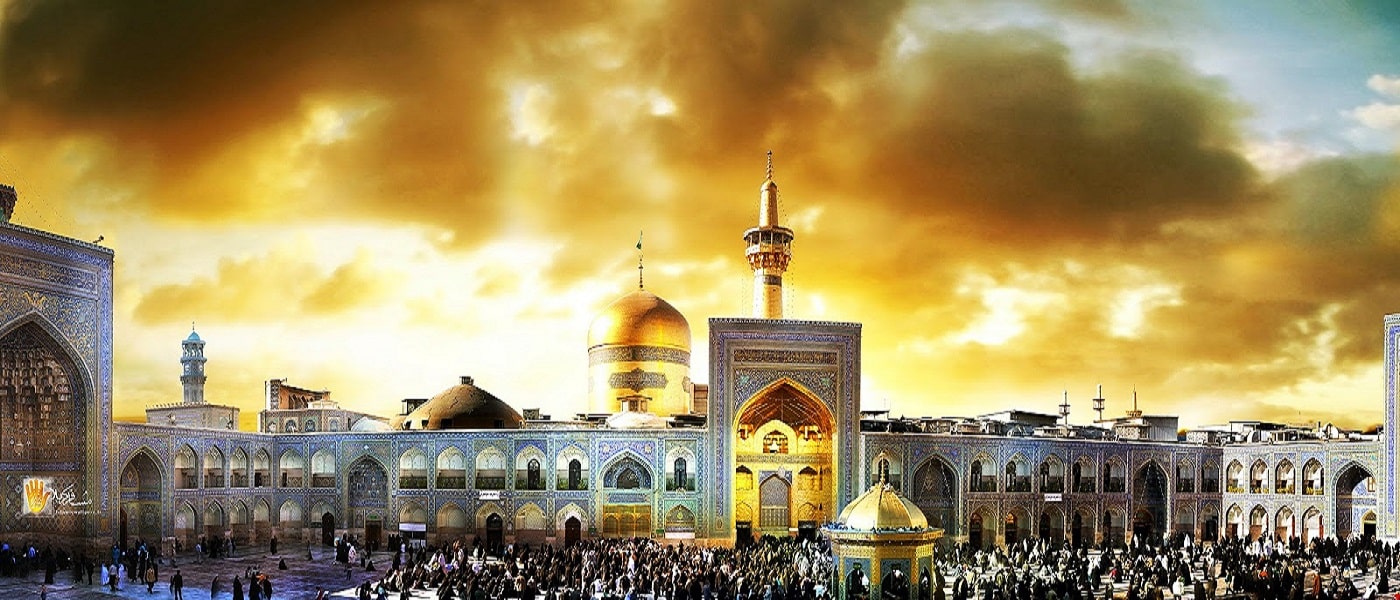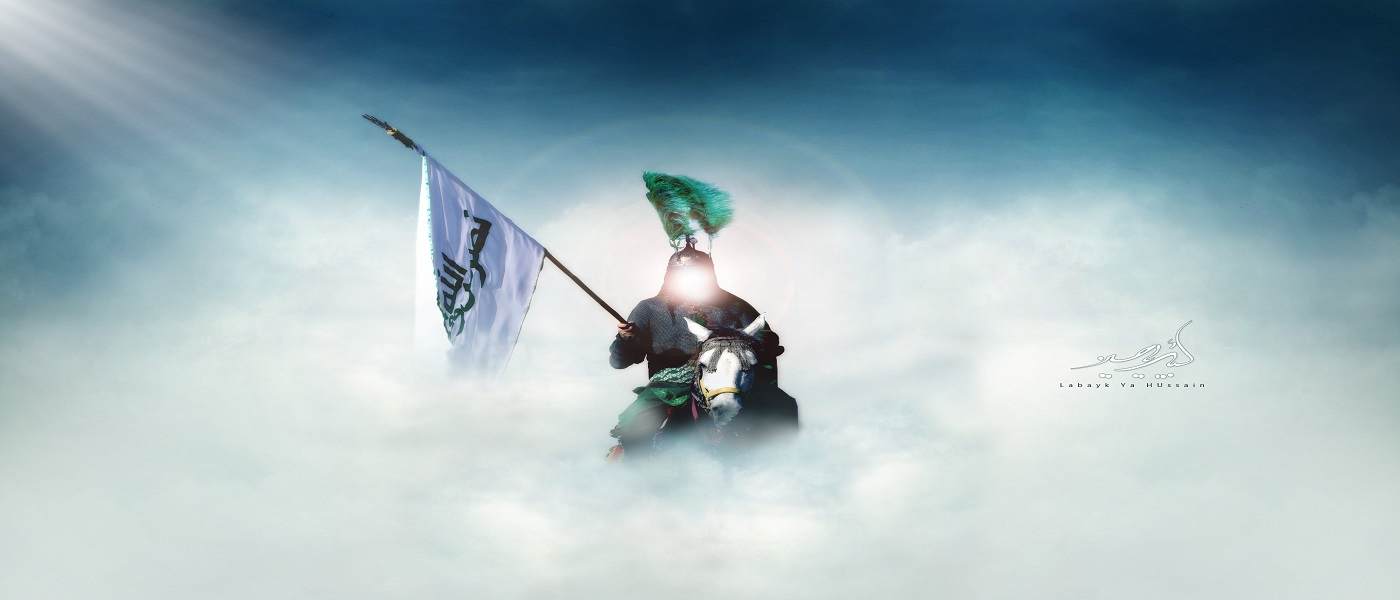

Six Moral Traits of the Eighth Infallible Imam, Imam Rida (AS)
Imam Rida (AS) is the eighth infallible Shiite Imam and successor of the final holy Prophet (PBUH&HP). His name is Ali, and among all his other names and titles the most famous honorary one is “Rida,” which means ‘satisfaction’. But why was he called this name?
According to his son, Imam Jawad (AS), “The Almighty Allah named him Rida because He was pleased with him in the heavens and the Prophet of Allah (PBUH&HP) and the Imams of guidance (AS) were pleased with him on earth” [1]. In fact, Imam Rida (AS)’s moral qualities and virtues were so high that even his enemies were attracted to and admired him. You might wonder what these traits are!
1. Imam Rida's (AS) Forbearance
Imam Rida (AS) was the exemplar of a patient man. There were times when he was treated disrespectfully, but he would not react and preferred to remain silent. It has been narrated that when Caliph Mamun[i] tried to degrade Imam Rida’s (AS) position through scientific and theological debates with the contemporary scholars of other religions and opponents, Imam would patiently make the best use of those meetings and introduced the true religion of Islam to the world.
2. Imam Rida's (AS) Modesty
While having a meal alone, Imam Rida (AS) would invite all his slaves, servants, including the Blacks, to have the meal with him at the same place. And when he was told to make separate eating arrangements for the servants, he would refuse and say: “We are all created by God, our parents (Adam and Eve) are the same, everyone will be dealt with by God according to their deeds” [2].
Once a man said to Imam Rida (AS): “By God, you are the best in the world,” but Imam replied: “Do not swear by the name of Allah. Anyone who is more pious than me can be better than me.” Then he recited the following verse of the Quran:
“O, humankind! Verily, We created you all From a male and female [Adam and Eve] and appointed for your tribes and Nations to be known to each other [by Specified characteristics] Verily, in Allah's Sight the most honorable of you Is the most pious of you; and Allah is The Informed Owner of Knowledge” (49:13) [3].
3. Imam Rida's (AS) Courtesy
Imam Rida (AS) would never hurt anybody with his words; He treated people as respectfully and kindly as possible; he would never talk badly to anyone or interrupt someone when speaking; he never stretched his legs or lean upon something in front of people. He always smiled instead of laughing loudly [4].
One night while Imam Rida (AS) was talking to his guest, there was a problem with the light. The guest wanted to fix it, but Imam did not let him do so. He started fixing it himself and said: “We are the ones who do not put our guests to work.”
Also, it frequently happened that Imam called a servant for some work, and he was told that the servant was busy having a meal; then Imam would say: “Let him finish his food” [5].
4. Imam Rida's (AS) Generosity
One day a foreign traveler came to visit Imam Rida (AS). After saying hello and expressing his love and affection towards Imam Rida (AS), his fathers and ancestors, he said he had come back from Hajj and had run out of money. He asked Imam to give him some money to go back home and promised to spend the same amount there on charity and giving alms (Sadaqah).
Imam stood up and went to another room. Then he came, stretched his hand from behind the door, and said: “Get this 200 Dinar and spend it for your journey, there is no need to pay the same back as alms.” The man got the Dinars and left. Imam later was asked for the reason for his secret help, and he answered: “Because I did not want the man to feel ashamed” [6].
Also, whenever Imam Rida (AS) wanted to have his meal, he would bring a large plate and put the best of the food on it to be given away to the poor. If he afforded to help, he would always give alms to the destitute at nights.
5. Imam Rida's (AS) Insight
In another account, One of Imam’s companions narrated that One day after he arrived home, he saw his servants busy repairing the house. Imam noticed a stranger among them and asked about him. They answered he was there to help them and they would pay him. Imam asked if they had defined the amount of payment.
The answer was no. Imam became disturbed and said: “when one works without any contraction, he thinks that you have paid him little, even if you give him three times more. But if you contract and pay him according to the contraction, he will be pleased with receiving his right. Now if you pay more even just a little, he will understand you have paid more and will be thankful” [7].
6. Imam Rida's (AS) Divine knowledge
Imam Rida (AS) had inherited the divine knowledge from his ancestor, our Holy Prophet, Muhammad (PBUH&HP).
He was the wisest man of his time and all his contemporaries. His knowledge was so rich in all religious matters and other realms of knowledge that the people of various tribes in their language would turn to him when they had questions, and he provided them with the best answers. Ma'mun, the ruling caliph, summoned the knowledgeable scholars in an attempt to defeat Imam Rida (AS) in several scientific debates and to discredit him in public. Nonetheless, Imam succeeded in all of them, and no one was capable of overcoming his power of knowledge.
Whoever dared to challenge Imam Rida (AS) ended up yielding to his unique power of reasoning. It has been confirmed by historians that Ma'mun, who was himself a celebrated erudite, pointed out the following statement, in his official charter for the appointment of Imam Rida (AS) as his immediate successor:
"I do not know any person superior to this man [Imam Rida (AS)] in the whole world" [8].
The life of Imam Rida (AS) and our other infallible Imams (AS) contains countless anecdotes of this sort, which reveals how they teach us the correct way of life both by their sayings and behaviors.
In a famous tradition or saying (Hadith) called the Golden Chain (Selselah al-Zahab), Imam Rida (AS) said that he had heard from dignified ancestors quoting from Gabriel and Almighty Allah that: “The word of La Ilaha Illallah -there is no god but Allah- is My stronghold (then whoever acknowledges this has entered My stronghold) and will be saved from My punishment”. After reciting this saying for his companions, Imam paused for a while and then continued, “Few conditions are entitling this entrance, and I am one of its conditions.”
Through this account, Imam Rida (AS) confirms that the belief in monotheism (Tawhid) will be counted as perfect when it is based on the obedience of the infallible Holy Imams (AS). In fact, Imams’ lifestyle and traditions were so good that if we idolize them and follow in their footsteps, we will certainly be able to move through the stages of spiritual perfection and win Allah’s satisfaction. Insha’Allah!
Notes:
[i] The Abbasid caliph in power at Imam Reza’s (AS) time.
References:
- Bihar al-Anwar, V.49, P.4.
- Osool al-Kafi vol.8 p.230.
- Oyoun Akhbar al-Reza, v.2, p.236.
- Al-Fadl ibn al-Hasan Tabarsi, Aa’lam al-Vara p.314.
- Osool al-Kafi vol.6 p.383 & 298.
- Managhib vol.4 p.360.
- Osool al-Kafi vol.5 p.288.
- Al-Irshad, v.2, p. 261.
Share This Article

What Are the Solutions to Depression and Stress in Islam: Part2
In the first part of the article, some stress relieving practices were discussed. Here we complete the list with other advises proposed for facing stress in Islam.
Visiting Family and Gathering with Friends, especially Believers and Those of the Same Religion
Isolation is undoubtedly the worst way to deal with depression, although some have a completely opposite view on this matter. In general, upholding kinship with relatives and visiting them regularly, benefits one from their social and emotional support [1]. And particularly, in the case of having a problem as serious as depression, they will not leave their loved ones alone and will help to find the resources to get him/her treated. That’s why keeping family ties is strongly emphasized and recommended in Islamic teachings [2].
Gathering frequently with supportive friends can also play a big role in making depression more manageable and relieving stress in Islam. In Islamic resources, trustworthy friends are known to be like one’s eyes and hands, and family and properties of a person; they are rare and invaluable [3], and they can help a lot to deal with such disorders.
Marriage in Islam
It is stated in Surah Rum that God has created mates for the human beings which are the source of solace and comfort to them (30:21). Prophet Muhammad (PBUH) said that after Islam, nothing is more beneficial than a righteous, kind, Muslim wife who brings a smile to the face when looking at her [4]. That is within a lawful (Halal) marriage that both sides receive pure affection and emotional support from each other; respond safely to their sexual urge; help and encourage each other to achieve their goals, promote their social statue and get a better economic situation. Moreover, the researchers suggest that marriage provides the companionship and emotional support needed to help alleviate depression [5]. Hence, many of one’s worries might fade in a successful marriage [6].
Taking on a Nice Appearance, A way of Relieving Stress in Islam
Looking clean and nice is one of the manners of Prophet Muhammad (PBUH). It makes one look good, feel good, be confident and attract the company of people and their respect which consequently helps one’s stress to be healed. Prophet Muhammad (PBUH) used to put on perfume and always advised others to do so [7]. On the contrary, looking disheveled has always been blamed in Islamic teachings and narrations since it is believed that one should make the most of the blessings of life [8]. The effect of having a clean and nice appearance and smelling good manifests itself in a healthy, joyful individual [9].
Healthy Entertainments and Physical Activities to Face Stress in Islam
Doing sport and healthy entertainments are highly advised in Islam due to its wonderful benefits on one’s peace and success. Prophet Muhammad (PBUH) said that a wise person divides his daily schedule to four parts and dedicates one of them to lawful (Halal) and healthy entertainment which comforts heart and mind [10]. Imam Ali (AS) has emphasized the impacts of cheerful moments and the state of being happy on one’s soul and mind, too [11, 12]. However, entertainment should not be confused with useless activities. Doing sports especially horse riding, shooting and swimming are encouraged in Islam [13, 14]. On the contrary, playing marbles, gambling or any kind of activity with the intent of winning money or material goods [15], and any entertainment which is a waste of time (like sitting in front of the TV all day and doing nothing else) are absolutely forbidden. That is due to the fact that one gains nothing for doing such activities but loses time and energy, and Muslims are warned neither to lose nor to cause damage.
Acts of Charity
One of the psychological impacts of giving charity is the joy that the donor will experience in his/her heart. Acts of charity and helping others might happen in several forms, like watering a plant, teaching, helping deaf (without nagging and complaining) to communicate with others and being tolerant towards people [16]. In Surah Baqara, it is said that those who spend their wealth in the way of Allah, will be surely rewarded by their Lord. Moreover, they will not fear, nor will they grieve (2:262).
References:
- A. Javadi Amoli, “Mafatih al-hayat”, p. 216.
- what does islam say about maintaining family ties
- M. al-Kulaynī, “Al-Kafi”, vol. 2, p. 248.
- Shaykh Tusi, “Tahdhib al-ahkam fi sharh al-muqni'a”. vol. 7, p. 278, T. 4.
- Frech, A. and Williams, K., 2007. Depression and the psychological benefits of entering marriage. Journal of Health and Social Behavior, 48(2), pp.149-163.
- stress in life
- M. al-Kulaynī, “Al-Kafi”, vol. 6, p. 510.
- A. Javadi Amoli, “Mafatih al-hayat”, p. 164.
- H. F. Tabarsi, “Makarim al-akhlaq”, p. 42.
- Shaykh Sadouq, “Ma'ani l-akhbar”, p. 334.
- “Ghurar al-Hikam wa Durar al-Kalim”, T. 3992.
- “Ghurar al-Hikam wa Durar al-Kalim”, T. 3993.
- Al Suyuti, “Jami al-saghir”, vol. 1, p. 38.
- Al Suyuti, “Jami al-saghir”, vol. 1, p. 627.
- Ibn Babawayh, “Al-Khisal”, p. 331.
- A. Javadi Amoli, “Mafatih al-hayat”, p. 547.
Read More

5 Questions that Reveal Imam Hussain (AS) Was against War
Looking at Imam Hussain (AS)'s movement and the incidents that took place on Karbala, one might wonder if Imam Hussain (AS) ever had the intention of going to war with Yazid or not. In what follows, we raise some questions that will reveal Imam Hussain (AS)'s real attitude toward war.
1. Why Would He Leave Medina to Mecca?
He did not wish to take the oath of allegiance of a ruthless and corrupt person as Yazid, so he decided to peacefully migrate from Medina to Mecca in which many people had not accepted Yazid’s oath of allegiance yet. In his will which he wrote before leaving Medina, he says:
“I am not leaving here out of selfishness or with the aim of oppression or corruption, but for the sake of improving Muslims’ condition of life. I want to enjoin the right (Amr bi-l-ma’ruf) and forbid the wrong (Nahy’ ani-l-munkar) and to act according to Prophet Muhammad (PBUH&HP)’s and Imam Ali’s (AS) way”.
2. Why Did Imam Hussain (AS) Take All His Property and His Family with Him?
His first motivation to leave Medina was migration, not war. So he left Medina to Mecca along with his family and companions without making any violent move against Yazid. On the day of Ashura on which Imam Hussain (AS) was martyred, 17 to 19 people of his family and relatives were among his companions, including some women and children. Among the martyrs of Karbala, also, there were five teenagers and children. One might ask, as Charles Dickens once asked if Imam Hussain (AS) were after worldly desires as taking over the throne, why would he take his family and children with him and risk their lives?
3. Why Would He even Go to Kufa? Should He Have Left Kufa People’s Letters Unresponded?
Imam Hussain (AS) had no intention of going to Kufa, but he was persuaded to do so by the many letters he received from Kufa people asking him to help them against Yazid’s tyranny. His speech in front of Hur’s army proves this fact:
“O’ people! This is my last word to you so that there would be no excuse in Allah’s presence. I would not come to you if you had not sent your letters and messengers and asked me to come to you. You told me that you didn’t have a leader and wanted Allah to guide you through me. So, if you still keep your words, I will come to your city, and if you don’t want me to come, I will return.”
4. Why Did He Refuse to Fight with Hur’s Army Despite His Strength?
When surrendered by Hur and his army, Zuhair, one of Imam Hussain’s (AS) companions, suggested fighting them. Since they were not still much in number and Imam Hussain’s (AS) camp had the strength to defeat them. However, Imam Hussain (AS) rejected his view and told him that if there would be a war, he did not wish to be its initiator, though he would defend himself if necessary.
5. Why Would He Wish to Postpone the War even for One More Day
Imam Hussain (AS) wanted to postpone the war as much as possible, not because he was afraid of fighting, but to give the enemy more time to think twice about their wrong decision. So, when on the evening of the 9th of Muharram, Umar ibn Sa’ad gathered his army and got them ready for the war, he sent them a message and asked them to postpone the war until the day after and he spent the night praying to Allah.
Even on the very day of Ashura, Imam Hussain (AS) did his best to dissuade the enemy of choosing the wrong path and losing the God-given blessing of life for a ruthless tyrant as Yazid and his vain intentions. That is because Imam Hussain (AS) who was the spiritual leader of Muslims and cared about their fate more than his own life, found it his responsibility to guide them toward what is right before it was too late [i].
Notes:
[i] For more information see Salam Islam's ebook: 40 Points about Imam Hussain (AS) and the Event of Karbala
Read More

